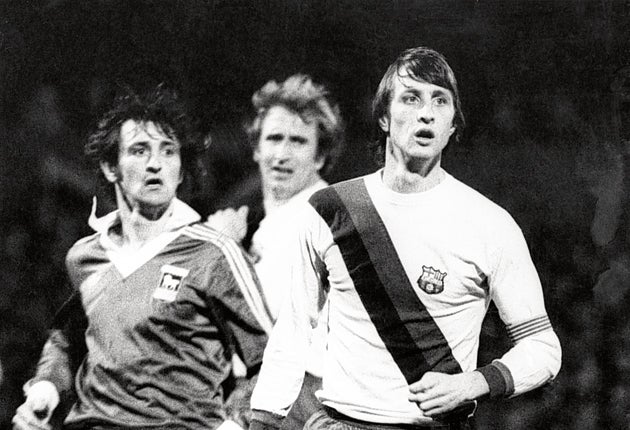The final showdown: two great nations united by beautiful game

Johan Cruyff summed up the difference between Spanish and Dutch football cultures from a manager's perspective thus: "It's the Spanish players who are better to work with. Dutch players already start to say 'Yes, but' when you open your mouth to speak."
Cruyff should know. He is the ultimate connection between the two great football nations but he is by no means the only one. Had Germany won last night's semi-final for a place in Sunday's World Cup final against Holland we would have known the battle lines quite clearly: an old grudge between two nations that goes back years. Spain v Holland is quite a different prospect.
Dutch footballers may, as Cruyff said, be more naturally disputatious than their Spanish counterparts but stylistically this will be a World Cup final between two teams who have passed the ball better than any other in this tournament. The Dutch are good at it. Their tradition from Rinus Michels to Steve McClaren's Dutch title season with FC Twente has been based on 4-3-3 and technical finesse. Holland's problem on Sunday will be that they just do not pass the ball as well as Spain.
In the aftermath of victory last night Vicente del Bosque was asked whether his Spain team played in the Dutch way. "I don't know if it looks like the Dutch style," he said. "If you have order then you can showcase individual talents." But the similarities are obvious. Spain's playmakers Xavi and Andres Iniesta dictate the game in the way that Holland's Wesley Sneijder likes to do. On Sunday, something has to give.
It is not in Holland's nature to play the game of spoilers but they may well look to the victory of Sneijder's Internazionale over Barcelona in the Champions League semi-final this season as a template for victory. They can allow their opponents possession as long as they contain them. And if they contain them then there is always a chance that Arjen Robben, Sneijder or Robin van Persie may be able to snatch a goal.
It is unusual that among all 23 members of the Dutch World Cup squad only one currently plays in Spain – the midfielder Rafael van der Vaart at Real Madrid. Since the great Dutch coach Michels went to Barcelona in 1971, later bringing Cruyff and Johan Neeskens with him, Holland's best footballers have been mined by the biggest clubs in Spain.
The most recent Dutch migration to Spain was at Real Madrid where Robben, Sneijder, Ruud van Nistelrooy, Klaas-Jan Huntelaar, Van der Vaart and Royston Drenthe formed a sizeable Dutch contingent at Real Madrid. All but Van der Vaart and Drenthe have now left, most of them sold to make way for the major signings of last summer.
The typical Dutch player, technically accomplished and a good traveller when it comes to playing abroad, has been well-suited to the Spanish game. In fact they have gone to Spain in such numbers since the 1970s that at times you wonder which way the influence has worked – that the Dutch game has had just as much effect on the Spanish way of playing.
Nowhere more than at Barcelona, where Cruyff's success as a player and then as a manager has formed an enduring connection between Barca and the Dutch. There has been a remarkable influx of Dutch players at the club including, but not limited to, Ronald Koeman, Michael Reiziger, Phillip Cocu, Patrick Kluivert, both De Boer brothers, Marc Overmars and Edgar Davids.
Of the current Dutch team both Mark van Bommel and captain Giovanni van Bronckhorst have played for Barcelona. Frank de Boer and Cocu are both among manager Bert van Marwijk's assistants. The connections between the two teams are everywhere. As for Cruyff, he has just been sacked from his honorary position at Barcelona by new president, Sandro Rosell.
On Sunday there will not be the history and animosity of a Holland v Germany final but there will undoubtedly be the quality. Europe is full of those old grudges and rivalries but these two great football nations are different. The story of Holland's great players, and Spain's great clubs, is a shared history.
Join our commenting forum
Join thought-provoking conversations, follow other Independent readers and see their replies
Comments